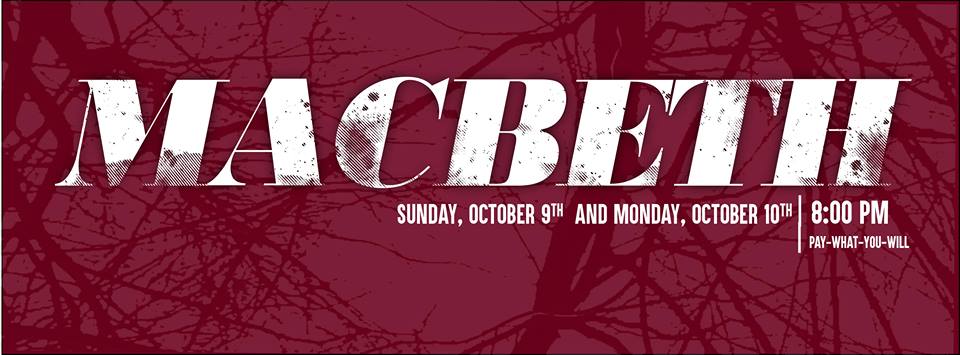by Kyle Smith
October 9 saw the Compass Shakespeare Ensemble premiere Macbeth. As usual, the lights stay up in the Blackfriars. What is unusual this time is the Scottish thanes and warriors among the audience. They move and speak freely among those coming into the space, before the usual pre-show speech begins. After the requisite request to silence cell phones, the pre-show spiel is interrupted by violence and havoc. War has broken out in Scotland, and Macbeth begins in earnest, immediately pulling its audience in.
Already Shakespeare’s shortest tragedy, Compass Shakespeare Ensemble cut The Tragedy of Macbeth down to one hour for its educational show.
“I think this is a good story for schools because primarily this is something that is on their syllabus,” said director Kelley McKinnon. “Seeing it live is completely different so many teachers treat it like it’s literature, when we all know it was never written to be read, it was written to be spoken.” Cutting the play down to an hour resulted in a heavy focus on fights, most of which the title character is involved in.
That character, Macbeth: who begins the play as the Thane of Glamis, and then Thane of Cawdor, and ultimately King of Scotland, has puzzled readers, viewers and scholars alike for centuries.
“I was trying to find ways to find the arc of Macbeth, find the humanity in a person that is ultimately becoming entrenched in evil,” said Josh Williams (Macbeth). He and McKinnon wanted to portray Macbeth as a man who starts the play as a good person, and moves towards evil through a logical progression rather than lust for evil. McKinnon looked to the modern cultural landscape for a context that this could work in.
“We watched the descent of Captain America,” McKinnon said. “It’s much harsher to watch someone good go down that hill than someone who starts off bad, which is uninteresting to me.” McKinnon and Williams also took inspiration from Captain America in Macbeth’s physicality, particularly his use of a shield as a weapon. The shield served a variety of functions, from a seal for Cawdor, to the cauldron of the witches, and finally Macbeth’s weapon in the final battle.
“We like to talk about economy of action and properties,” Williams said. “and changing the way those things are used and reacted towards so that we can have just a few props.”
While Macbeth is a dark play, Compass Shakespeare brought levity to it through its audience interaction. The infamous porter (Zac Harned) engaged the entire audience in creating a knock knock joke; Fleance (Clarence Finn) won the audience over with his childlike exuberance. Even these elements were an extension of the first moments someone walked into the Blackfriars.
“It was one of the most hospitable theatre environments to walk into as an audience member,” said Doreen Bechtol. “The buzz in that room was so electric. Sometimes you get that vibe from music, but music is there to create it. What was interesting was that in this instance, it was the actors, not the characters, interacting with the audience. It was infectious!”
While these moments garnered laughs, it was important to Compass Shakespeare that these moments were organic rather than planned in advance.
“There was a great desire to build relationships within and without,” said Melinda Marks (Banquo). “The culture in the rehearsal room that Kelley cultivated was a desire to be understood.”


